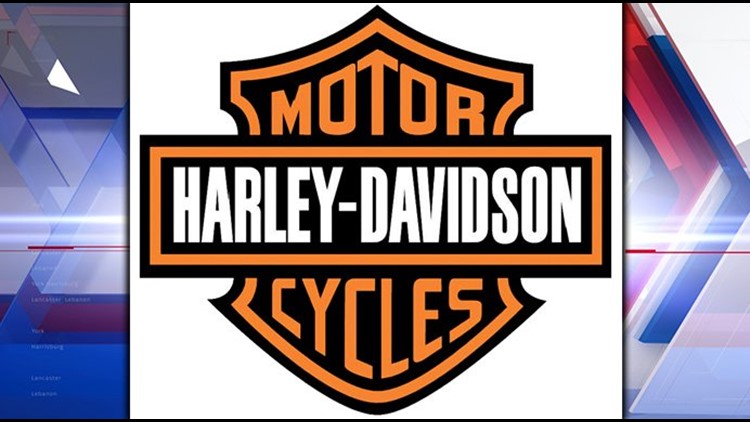YORK COUNTY, Pa.– Harley Davidson is set to begin shifting the production of motorcycles meant for Europe from the United States to factories overseas.
The EU is imposing tariffs on $3.2 billion worth of American goods, including motorcycles, orange juice, bourbon, peanut butter, motorboats, cigarettes and denim. They are a response to the Trump administration’s tariffs on steel and aluminum imports from Europe.
In an SEC filing released on Monday, the company said that European Union tariffs on motorcycles exported from the United States jumped from 6 percent to 31 percent, forcing the move.
That will make each bike about $2,200 more expensive to export, Harley said. Harley is not raising prices for customers.
Harley Davidson said that the company’s prices will not rise due to “an immediate and lasting detrimental impact to its business in the region.”
The company said it will take a hit of $30 million to $45 million for the rest of this year.
Harley-Davidson’s stock fell 2% in pre-market trading.
Below is an excerpt of the SEC filing:
The European Union has enacted tariffs on various U.S.-manufactured products, including Harley-Davidson motorcycles. These tariffs, which became effective June 22, 2018, were imposed in response to the tariffs the U.S. imposed on steel and aluminum exported from the EU to the U.S.Consequently, EU tariffs on Harley-Davidson motorcycles exported from the U.S. have increased from 6% to 31%. Harley-Davidson expects these tariffs will result in an incremental cost of approximately $2,200 per average motorcycle exported from the U.S. to the EU.Harley-Davidson believes the tremendous cost increase, if passed onto its dealers and retail customers, would have an immediate and lasting detrimental impact to its business in the region, reducing customer access to Harley-Davidson products and negatively impacting the sustainability of its dealers’ businesses. Therefore, Harley-Davidson will not raise its manufacturer’s suggested retail prices or wholesale prices to its dealers to cover the costs of the retaliatory tariffs. In the near-term, the company will bear the significant impact resulting from these tariffs, and the company estimates the incremental cost for the remainder of 2018 to be approximately $30 to $45 million. On a full-year basis, the company estimates the aggregate annual impact due to the EU tariffs to be approximately $90 to $100 million.To address the substantial cost of this tariff burden long-term, Harley-Davidson will be implementing a plan to shift production of motorcycles for EU destinations from the U.S. to its international facilities to avoid the tariff burden. Harley-Davidson expects ramping-up production in international plants will require incremental investment and could take at least 9 to 18 months to be fully complete.Harley-Davidson maintains a strong commitment to U.S.-based manufacturing which is valued by riders globally. Increasing international production to alleviate the EU tariff burden is not the company’s preference, but represents the only sustainable option to make its motorcycles accessible to customers in the EU and maintain a viable business in Europe. Europe is a critical market for Harley-Davidson. In 2017, nearly 40,000 riders bought new Harley-Davidson motorcycles in Europe, and the revenue generated from the EU countries is second only to the U.S.Harley-Davidson’s purpose is to fulfill dreams of personal freedom for customers who live in the European Union and across the world, and the company remains fully engaged with government officials in both the U.S. and the EU helping to find sustainable solutions to trade issues and rescind all tariffs that restrict free and fair trade.Harley-Davidson will provide more details of the financial implications and plans to mitigate the impact of retaliatory EU tariffs during the company’s second quarter earnings conference call on July 24, 2018, at 8:00AM CDT.The company intends that certain matters discussed in this report are “forward-looking statements” intended to qualify for the safe harbor from liability established by the Private Securities Litigation Reform Act of 1995. These forward-looking statements can generally be identified as such because the context of the statement will include words such as the company “believes,” “anticipates,” “expects,” “plans,” or “estimates” or words of similar meaning. Similarly, statements that describe future plans, objectives, outlooks, targets, guidance or goals are also forward-looking statements. Such forward-looking statements are subject to certain risks and uncertainties that could cause actual results to differ materially, unfavorably or favorably, from those anticipated as of the date of this report. Such risks and uncertainties include the following, among other factors: (i) uncertainties regarding the quantity and mix of motorcycles that the company exports from the U.S. during the periods in question; (ii) uncertainties regarding the import prices of motorcycles; (iii) whether the EU tariffs apply to shipments that had already commenced at the effective time of the tariffs; (iv) uncertain timing associated with shifting production from the U.S. to international facilities; and (v) uncertainties regarding the size and duration of EU tariffs. Shareholders, potential investors, and other readers are urged to consider these factors in evaluating the forward.



